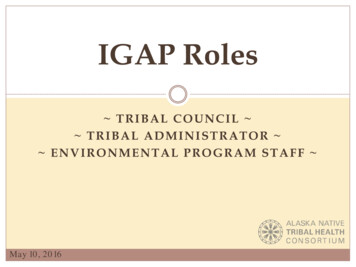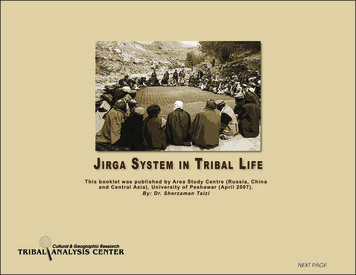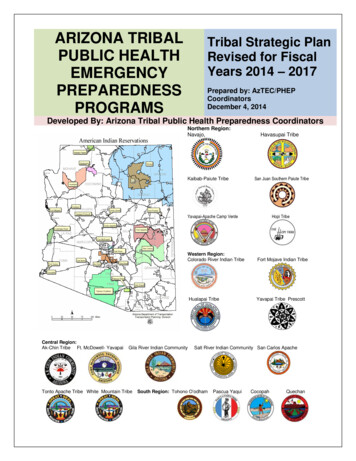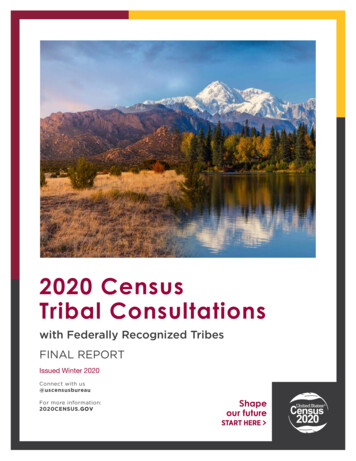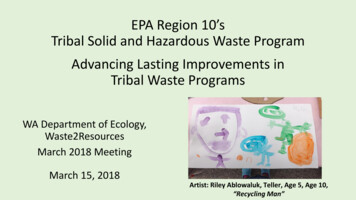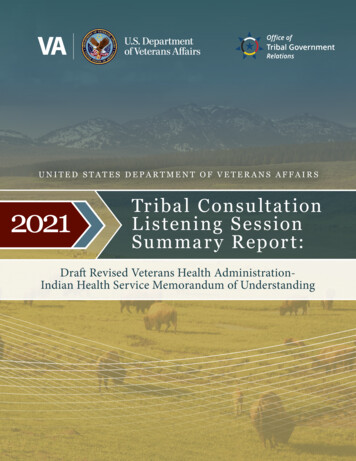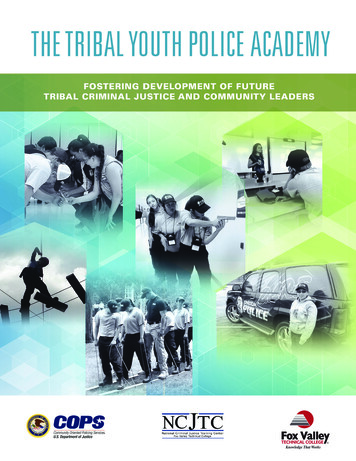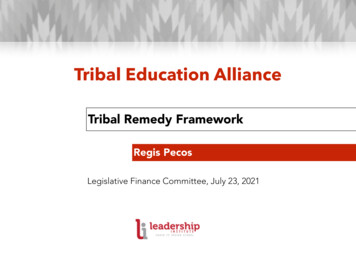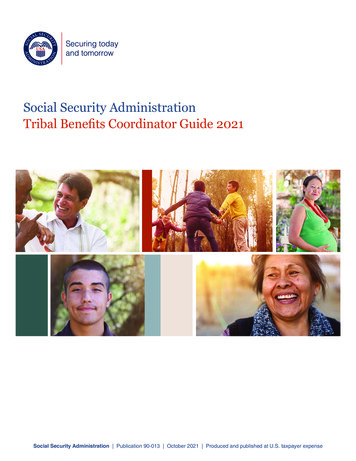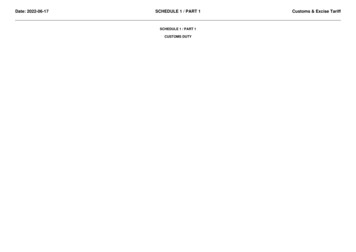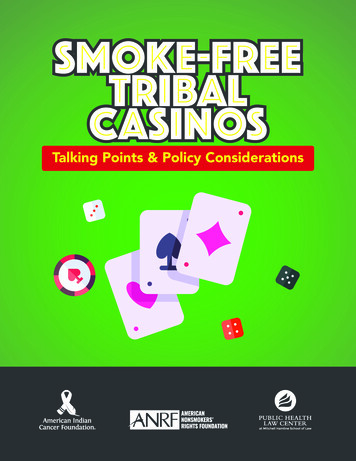
Transcription
IntroductionTribal Nations have sovereign authority to enact policies to protect their community members from theharms of secondhand exposure to commercial tobacco smoke. While many states have passed thesepolicies, not all Tribal Nations have done so as of yet. Because many Tribal casinos have closed due tothe COVID-19 pandemic, Tribal Nations across the country have been demonstrating the leadershipto prioritize the health of employees, patrons, and community members by reopening Tribal casinosas smoke-free facilities. We recognize the importance of tobacco as medicine for Indigenous peoples.This document refers to commercial tobacco usage and not the traditional or sacred use of tobacco.Benefits of Smoke-Free CasinosThe adverse health effects of secondhand smoke are well documented.1 Smoking is still allowed inmany casinos, and the health considerations in these settings are no less concerning.2 Advocates suchas Nathan Moose, Oglala Lakota, who never smoked but ultimately died from health complicationsrelated to working in a smoky casino,3 have spoken specifically about the dangers of secondhandsmoke in casinos.Tribal casinos such as the Ho-Chunk Gaming Madison, WI, have already made the transition to smokefree.4 This move will benefit the health of customers, employees, and community members.5 HoChunk Gaming Madison Management reported that although revenues dropped initially after theswitch to smoke-free air, the casino recovered financially and ultimately did better business becausemost customers preferred smoke-free air.6 This is consistent with studies showing that casinos will notlose business if they make the transition to smoke-free air.71
Talking PointsReopening the casino smoke-free maximizes and preserves the investmentmade to clean and sanitize during the COVID-19 pandemic. This cleanliness canbe promoted to new patrons.There is no safe level of exposure to secondhand smoke.8A smoke-free casino is financially beneficial.Offering a smoke-free casino results in employees with higher work productivity using fewersick days and can lower health insurance premiums. The American Cancer Society reportedthat employees who smoke have an average insurance payment for health care of 1,145,while nonsmoking employees average 762.9Fewer resources will need to be dedicated to maintenance from second and thirdhandsmoke; for example, the U.S. Environmental Protection Agency (EPA) estimated thatsmoke-free restaurants can expect to save about 190 per 1,000 square feet each yearin lower cleaning and maintenance costs.10In some cases, smoke-free workplaces have the potential to reduce both fire and liabilityinsurances.11Reopening the casino smoke-free maximizes and preserves the investmentmade to clean and sanitize during the COVID-19 pandemic which can be usedto promote to new patrons.Due to COVID-19, employees and patrons will expect clean and safe indoor environments towork and play in and will seek opportunities that do not jeopardize their health.Casino marketing departments can use reopening smoke-free as leverage to appeal to newand existing patrons who prefer a smoke-free environment.Patrons prefer a smoke-free casino.In 2018, the majority (86.3%) of American adults were not current smokers.12One study examined attitudes toward smoke-free casino policies among US adults and foundthat overall, 75% of US adults favored smoke-free casino policies.132
Laying the GroundworkAs with any policy change campaign, community engagement is essential. Creating a smoke-freepolicy for a Tribal casino is a big change and the policy will be more successful if stakeholders suchas casino management, elected Tribal leaders, elders, and public health advocates are engaged earlyon.14Policy ConsiderationsAny policy should reflect the values of its community. Depending on the level of formality of a policy,it might include several elements such as findings, purpose, definitions, prohibitions, exceptions, enforcement, implementation, and evaluation. Sample policies can be helpful as templates,15 but theycannot take into account the unique characteristics of each community. This is particularly true in thecontext of Tribal policies, given the wide variety of cultural practices in Native communities. In thecontext of smoke-free Tribal casinos, there are several policy components that merit specific consideration:Traditional Tobacco: Many Tribal communities have a rich history of sacred tobacco use whichdoes not carry the same risk of death and disease as commercial tobacco.16 Consequently, policiesshould be drafted so as not to restrict the use of sacred tobacco. Prior to drafting policy language,it is important to determine whether and how sacred tobacco is defined and used in the community. Consulting with elders and ceremonial leaders should be part of this process.E-Cigarettes: Emerging science shows that the aerosol emitted by electronic cigarettes is notharmless.17 Further, there is no known sacred use of e-cigarettes. As a result, many smoke-freepolicies restrict the use of e-cigarettes in the same way that the use of conventional combustiblecommercial tobacco is restricted.18 The e-cigarette marketplace is constantly evolving, so it is important to define e-cigarettes broadly to ensure that novel products are included in any policy torestrict e-cigarette use.Outdoor Areas: Smoke-free policies have conventionally taken the form of clean indoor airlaws; however, emerging studies show that secondhand smoke also poses dangers in outdoorenvironments.19 Consequently, policy makers and advocates should consider whether they want asmoke-free policy to include outdoor areas under their control and, if so, which outdoor areas. Acomprehensive casino policy would prohibit smoking in all outdoor areas under casino management. Some policies allow smoking to occur in outdoor designated smoking areas (DSAs). Any provision to allow smoking in a DSA should be narrowly drawn to protect the public from secondhandsmoke to the maximum possible extent.3
Policy Duration: Some casinos have reopened as smoke-free, but only on a temporary basis.Adopting a permanent smoke-free policy is a stronger public health measure that has the benefit ofsetting clear expectations for staff and customers.Technical Assistance providers such as the Public Health Law Center, American Indian Cancer Foundation, and American Nonsmokers’ Rights Foundation can be consulted when crafting a policy. Contactinformation can be found here:1 See, e.g., 2006 Surgeon General Report2 See, e.g., Centers for Disease Control and Prevention, Secondhand Smoke and Casino Dealers, 6/smoke/; AmericanNonsmokers’ Rights Foundation, Health Benefits of Tribal Casinos Going Smokefree, s-going-smokefree/; American CancerSociety Cancer Action Network, The Risks of Secondhand Smoke in Casinos, -secondhand-smoke-casinos.3 See American Nonsmokers’ Rights Foundation, We remember a wonderful man: Nathan Moose, Oglala Sioux, 1958-2013, -2013/4 See American Nonsmokers’ Rights Foundation, From Smoke-Filled to Smokefree: One Tribal Casino’s Journey for Health, bal-casinos-journey-health/5 L;kj;l6 Id.7 Gambling with Our Health: Smoke-Free Policy Would Not Reduce Tribal Casino Patronage, Isaiah “Shaneequa” Brokenleg, MPH, Am J Prev Med. 2014 Sep; 47(3): s/PMC4699561/; Timberlake et al, Tribal casinos in California: the last vestige of indoor smoking, BMC Public Health 2012, loads/2015/0/bmc pub health timberlake.pdf.8 See, U.S. Surgeon Generals Report, 20109 See, American Nonsmokers’ Rights Foundation, Smoke Free Casino Model Policy and Implementation Toolkit10 See, The cost of smoking to business. American Cancer Society. Retrieved from www.cancer.org/docroot/NWS/content/ NWS 2 1x The Cost of Smoking to Business.asp.; American Nonsmokers’ Rights Foundation, Smoke Free Casino Model Policy and Implementation Toolkit11 See, Health Now! and the business community, from www.healthnowma.org; American Nonsmokers’ Rights Foundation, Smoke Free Casino Model Policy and Implementation Toolkit12 See, Centers for Disease Control and Prevention, Office of Smoking and Health, Data and Statistics; Creamer MR, Wang TW, Babb S, et al. Tobacco Product Use and Cessation Indicators Among Adults – United States, 2018. Morbidity and Mortality Weekly Report 2019;68(45);1013–101913 Tynan MA, Wang TW, Marynak KL, Lemos P, Babb SD. Attitudes Toward Smoke-Free Casino Policies Among US Adults, 2017. Public Health Rep. 2019;134(3):234-240.doi:10.1177/003335491983458114 See, e.g., National Native Network webinar “Strategies to Reopen Tribal Casinos 100% Smoke-Free,” May 15, 2020, https://youtu.be/ypKmgRKAdD0; The Canli Coalition,4
Tribal Tobacco Advocacy Toolkit, https://www.findyourpowersd.com/toolkit/; Public Health Law Center, Drafting Tribal Public Health Laws and Policies, df.15 See, e.g., National Congress of American Indians Resolution #SPO-16-046; “Supporting Policies to Reduce Commercial Tobacco Use, Secondhand Smoke Exposure andTobacco-Related Disease among American Indians and Alaska Natives16 See National Native Network, “Traditional Tobacco,” on/traditional-tobacco-use/.17 See, e.g., U.S. Surgeon General, “E-Cigarettes,” https://e-cigarettes.surgeongeneral.gov/18 See, e.g., Public Health Law Center, U.S. E-Cigarette Regulations – 50 State Review, igarette-regulations-50-state-review.19 See, e.g., Public Health Law Center, “Outdoors,” utdoors.Notes5
policies, not all Tribal Nations have done so as of yet. Because many Tribal casinos have closed due to the COVID-19 pandemic, Tribal Nations across the country have been demonstrating the leadership to prioritize the health of employees, patrons, and community members by reopening Tribal casinos as smoke-free facilities.
